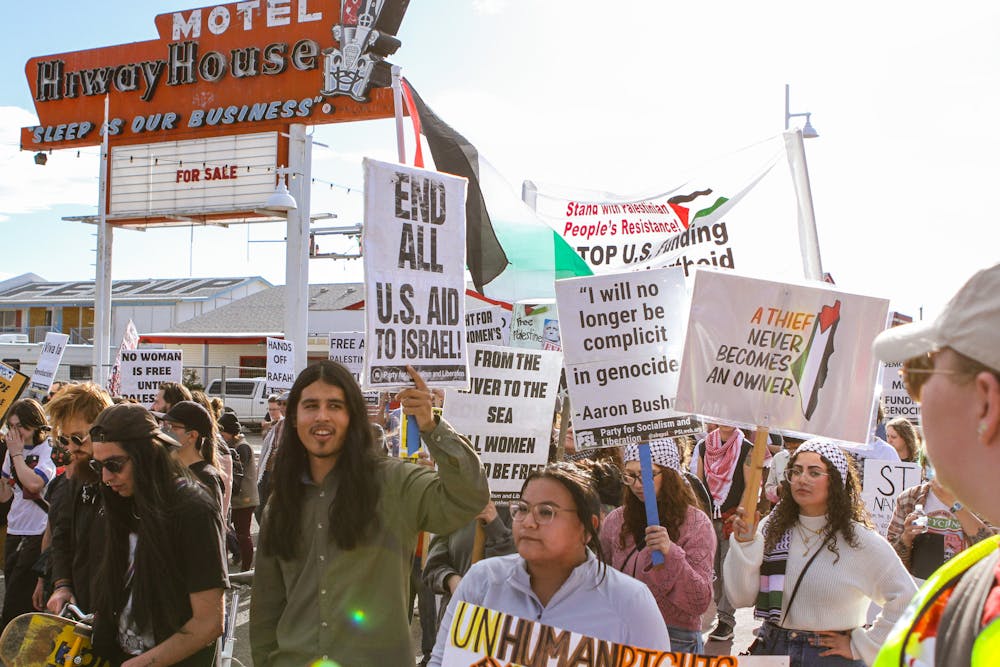Somewhere between 3 and 4 a.m. on April 30, a rapid series of dings from my phone awoke me suddenly. I was immediately alert – I knew what this meant.
A couple of hours earlier when I resigned myself to the necessity of sleep, I turned up my ringtone to full volume. This way, I would hear notifications from my group chat with Daily Lobo reporters Paloma Chapa, Leila Chapa, Ella Daniel and outgoing editor-in-chief Maddie Pukite.
If anything drastic happened while the reporters were barricaded inside the Student Union Building, covering its occupation by pro-Palestine protesters, I would be aware and ready to drive to the University of New Mexico to pick them up.
I unlocked my phone. The Chapa sisters and Daniel relayed to Pukite and I the actions of New Mexico State Police in riot gear: “THEY CHARGED”; “Saw cops literally trample someone”; “THEY F*CKING CHARGED I WAS SCARED FOR MY LIFE.”
Since that night, I have been perpetually reflecting on the role of student journalists in a nationwide protest movement on college campuses.
As of May 10, over 2,800 people have been arrested or detained on U.S. college campuses in relation to pro-Palestine protests, according to the New York Times. Sixteen of those arrests took place at UNM on April 30.
Student journalists are in an assuredly unique position.
We report on events taking place in our backyards in real time, amidst essays and exams. We walk past the solidarity encampment at the Duck Pond on our way to class, reminding ourselves to stop back by later for a photo for the next day’s newsletter. We request interviews to ask critical questions of people in power at UNM who have expressed disdain over our videography.
But who better to write the most accurate, well-rounded stories possible?
Student journalists know their universities. We know what the atmosphere is like, so we are acutely privy to any shifts. We can be at the scene of any incident in a matter of minutes. We know the back ways to campus – the hidden, empty parking spots.
We are familiar with both our audience and the subjects of our stories, because we are them. They, like us, inevitably approach our writing with their own varied backgrounds and life experiences.
These connections improve our coverage. They allow us to exercise the empathy necessary for tackling such layered global issues and the people they affect.
Get content from The Daily Lobo delivered to your inbox
But these connections also increase fear of University pushback, of getting things wrong, of fellow reporters falling in harm’s way.
I remember Daniel’s voice on the other end of a phone call on April 29 as the clock crept closer to 9 p.m. when the SUB would technically close for the night.
“Are we going to get arrested?” she asked.
There was a playful lilt to her tone, but I heard the underlying anxiety. I reiterated an internally practiced spiel about the First Amendment, resisting the urge to start biting my nails.
As her newly elected editor-in-chief, I wanted to confidently promise Daniel she would be OK. Yet truthfully, I could not.
Student journalists at the University of California, Los Angeles were assaulted and sprayed with irritants while covering pro-Palestine protests on their campus, according to CNN. Student journalists at Dartmouth College were arrested for criminal trespass, as reported by New Hampshire Public Radio.
College newspapers are an integral piece of New Mexico’s local news puzzle, especially when other outlets have gaps in their coverage — the result of centering official statements by UNM administration rather than student voices.
The Chapas and Daniel were the first reporters at the Duck Pond solidarity encampment. They watched and spoke with protesters as the tents went up.
If journalism is the first rough draft of history, its college practitioners should have dedication pages in every textbook.
Lily Alexander is the editor-in-chief at the Daily Lobo. She can be contacted at editorinchief@dailylobo.com on Twitter @llilyalexander
Lily Alexander is the 2024-2025 Editor of the Daily Lobo. She can be reached at editorinchief@dailylobo.com or on Twitter @llilyalexander






